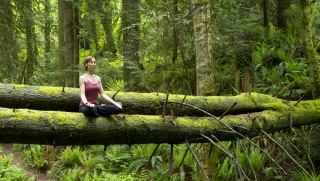While recently facilitating a self-compassion workshop, I referred to the three pillars of Taoism as moderation, compassion, and humility.
One of the participants asked if I could explain why humility is a virtue, for she interpreted humility as self-deprecation and unworthiness.
Figuring out how to be humble while maintaining self-compassion can be challenging. But once you have a few basic concepts in mind, putting them into practice may help you cultivate inner peace.
Why be humble?
Have you ever been in the presence of someone and notice your shoulders relaxing a bit, or that a sense of quiet comfort settles into your body? Does that happen at times when you feel fully seen, heard, and accepted without judgment?
Often these sensations arise while in the presence of humble people.
Humble people know their inner strengths and limitations without having to show off. Humble people embody inner peace and extend compassion to humanity.
This embodiment of humility emerges from self-acceptance borne from a belief that one’s innate value as a human being matters more than things such as six-figure salaries, the perfect body, the number of Facebook friends, or climbing the corporate ladder.
Instead, humble people appreciate actions that serve others. They value continual personal growth, recognizing that while no one is perfect, we can constructively grow and cultivate inner peace by challenging our limitations through seeking new ideas, advice, and constructive feedback.
Awe-inspiring inner strength is the outcome of this perspective.
Humility is not about being self-critical or self-deprecating
Being humble doesn’t mean being hard on yourself or thinking that you are worthless.
Instead, humility embodies quiet confidence and gentle self-appreciation that isn’t propped up by boasting or bragging. You have confidence in yourself, your skills, and your talents, but you don’t show off to gain approval from others.
When meeting other people for the first time, the humble person will share a bit about themselves and ask the other person about themselves. Sharing a bit, rather than listing off all your accomplishments first creates space for a give and take between you and the other person. You have enough inner peace that you don’t need to awe them with your talents from the moment you meet.
Humility means knowing things but not being a know-it-all.
Let that settle into your heart and your body for a moment, the idea that being humble is having knowledge but not needing to share it.
Sometimes sharing your experience is valuable and essential. Sometimes it is a way of sharing your gifts with the world.
However, imagine a time when you’re with a crowd of people. They all have a similar skill-set or gift as you. They’re sharing about how their skills show up in the world.
In this scene, imagine yourself quietly listening, without judgment, to how other people present themselves. You know that you could pipe in with a story of when you demonstrated the same skill, or perhaps when you did an even better job than in the story just shared. Yet you choose not to speak up.
Imagine that in this scenario, people begin swapping stories back and forth, trying to top one another. You remain quiet, listening. Then, imagine if one of the people in this group turned to you and with genuine curiosity and asked you to share your story.
Rather than trying to outdo anyone else, or to shine a light on yourself, someone in the group invites you to speak. So you share your story with grace and humility. A sense of joy about this skill or knowledge that you have comes bubbling up. You’re not trying to prove that you’re better than anyone else. Instead, you simply tell a story about something you’ve done well.
You speak humbly with clarity. You detach from a desire to impress others or be offered accolades. You talk with joy about the topic at hand.
This scenario is an example of having knowledge but not being a know-it-all. You share when asked and without one-upmanship.
This guided meditation, Listening as a Humility Practice, gently guides you through a scenario similar to the one mentioned here.
Humility is not about hiding your inner light
Being humble doesn’t mean you ought to pretend to be less than you are. False humility serves no one. You have gifts, just as others do. You have things to teach and learn, just as others do.
We all have different gifts and passions, but no matter what your talent is, have the confidence to share it. When you share your gifts and appreciate the gifts of others, you are humble.
Bring to mind some skill you have or aspect of yourself that where you excel. Consider the idea that, at birth, you received the essence of this ability. Though perhaps you’ve practiced honing this skill, or you’ve spent time learning about it. It may be innately yours, is a gift from some higher source.
Consider how this skill can serve others. Being humble doesn’t mean selfishly hoarding this expertise. Instead, humility asks us to share our gifts so that they can help others.
Another part of humility is the willingness to let others let their gifts shine, even if you may not care for their approach. Detach from judgment; you don’t need to prove them right or wrong. Merely being the best person you can be at any moment is how to be humble, and it’s a way to cultivate inner peace.
Enjoy basking in the knowledge that you have some particular skill you can offer to the world. You don’t need to prove it to anyone. You don’t need to show it off. People who are meant to benefit from this light will see it. Approaching the world from this perspective demonstrates tremendous inner strength.
Three suggestions for how to be humble
Though these suggestions appear simple, implementing them may not be easy. Be kind to yourself in the growing process. Practice these three suggestions daily will ultimately support your self-acceptance and self-compassion and help you help others learn to do the same.
1. Practice mindfulness and self-compassion
In the past decade, an increasing body of research suggests that mindfulness, meditation, and self-compassion lead to greater psychological resilience and emotional well-being.
Humble people are skilled at accurately assessing both their gifts and faults and use this awareness to continue their personal growth.
Mindfulness cultivates our self-awareness by inviting us to stop and notice, without judgment, our thoughts and emotions. We become mindfully aware of our inner lives, and our inner critics, and begin to see potentially limiting and unhealthy beliefs and actions.
Once we’ve given attention to those parts of ourselves that wreak havoc on our peace of mind, begin detaching from them emotionally. Detachment requires self-compassion, treating yourself with kindness and understanding. Embrace your noisy inner critic, befriend it, try to figure out what it needs, and all the while be as tender as you would to your dearest friend who’s just received bad news and it throwing a tantrum.
Once you become aware of and accept what needs changing, then you begin the process of transformation. Gently and patiently replace a negative thought or action with a positive one. Eventually, this process leads to inner strength and a deepening level of humility.
2. Embrace your humanness
At some time or another, we all fail at something important to us—a relationship, a job, learning a new skill. In response, our self-esteem may plummet because we attached our self-worth to those things.
Suddenly, in our minds, we become inadequate or unworthy, and the road back to self-acceptance can be long and difficult.
However, when you cultivate humility, you have a reserve of inner strength.
You’re more detached from the assessment of others and value your own opinion. So when you blunder or don’t live up to others’ expectations, it doesn’t mean something is wrong with you. Instead, it merely means you’re human. It’s ok to make mistakes. Learn from them if you can, then move on.
3. Express gratitude
Being humble does not mean thinking less of yourself. Instead, it means thinking of yourself less. Gratitude helps us shift our thoughts away from ourselves and to other people.
A 2014 study, “An Upward Spiral Between Gratitude and Humility,” found that “Humility is characterized by low self-focus, secure sense of self, and increased valuation of others. Gratitude is marked by a sense that one has benefited from the actions of another… Our results suggest that humility and gratitude are mutually reinforcing.” Incorporate gratitude into your daily life.
If you need to, start small. Express gratitude for your ability to breathe, eat, drink, or move—express gratitude for the sun or the rain, for sunrises and sunsets.
Even at this simple level, you begin to foster humility. As you become more humble, you can extend increasing gratitude. This spiral reinforces itself.
The next time you wonder how to be humble, remember that the key is seeing life as a journey toward cultivating the best aspects of ourselves, and in turn, we contribute to making the world a better place.
If you’d like to learn more about cultivating humility, or you want to strengthen skills you already have, enroll in an upcoming BodyMind IntelliSense or Compassion Cultivation Training program or join me for an International Spiritual Tour where we’ll time daily practicing compassion meditation, qigong, and tools to create a positive mindset while exploring beautiful landscapes and fascinating cultures.











